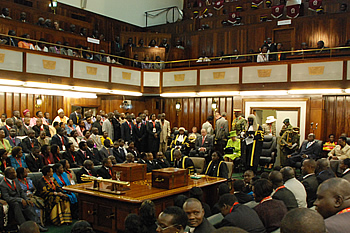
ORLANDO, Fla. (BP)–Exodus International has sent a letter to Uganda’s president, expressing concern over legislation that would prosecute homosexual behavior and would require pastors, missionaries, health care providers and counselors to report people suspected of such behavior.
The Christian ministry that seeks to assist homosexuals in overcoming unwanted same-sex attractions said in the letter that it believes homosexuality is not what God intended for individuals, but the proposed legislation is not the solution.
“If homosexual behavior and knowledge of such behavior is criminalized and prosecuted, as proposed in this bill, church and ministry leaders will be unable to assist hurting men, women and youth who might otherwise seek help in addressing this personal issue,” the letter, dated Nov. 16, said.
“The Christian church cannot and should not condone homosexual living or gay-identified clergy within its leadership, but it must be permitted to extend the love and compassion of Christ to all. We believe that this legislation would make this mission a difficult if not impossible task to carry out.”
The letter is signed by Alan Chambers, president of the Orlando-based Exodus International; Randy Thomas, the group’s executive vice president; Christopher Yuan, an adjunct professor at Moody Bible Institute; and Warren Throckmorton, a member of the Clinical Advisory Board of the American Association of Christian Counselors.
Homosexuality already is illegal in Uganda, punishable by up to 14 years imprisonment. But the Anti-Homosexuality Bill of 2009, introduced in October, would expand the punishment to include life imprisonment, and some cases would constitute a capital offense. For example, practicing homosexuals who have HIV would receive the death penalty under the new legislation.
The bill also would require authority figures to report homosexuals within 24 hours of discovering their behavior, and if they fail to do so, such leaders could be punished with up to three years in prison.
Exodus International began the letter, addressed to President Museveni and his wife, by commending the couple for their work to promote ethics in Uganda as well as their efforts to eradicate the HIV/AIDS epidemic. The four cosigners then said they wanted to humbly share their concerns regarding the anti-homosexuality bill.
“Many of us and those we know and work with have personally struggled with unwanted homosexual attractions and once lived as gay individuals, but have since found a new identity in Jesus Christ and have gone on to live lives that reflect the teaching of the Christian faith,” the men wrote.
“We sincerely believe that such transformations cannot best be achieved in an environment of government coercion where the vital support, care and compassion of others in the Christian community is discouraged and prosecuted.
“Please consider the influence this law will have upon those who may seek help in dealing with this difficult issue as well as church and ministry leaders committed to demonstrating the compassion of Christ to all,” the letter concluded. “We are praying for you, for this matter and for the people of Uganda.”
Chambers, Thomas and Yuan identified themselves in the letter as former homosexuals, and Yuan was listed also as an HIV survivor and AIDS activist.
Throckmorton, in a blog post on crosswalk.com Nov. 10, said the proposed legislation threatens to significantly compromise the success Uganda has had in curbing AIDS.
“Relevant to AIDS relief work, there is no exemption in the bill for professionals,” Throckmorton, who also serves as a psychology professor at Grove City College in Pennsylvania, wrote. “If a patient reveals homosexual behavior in the course of AIDS treatment or education, then those hearing the revelation must report. As might be expected, the bill is receiving condemnation from human rights groups, including those within the AIDS prevention and treatment community.”
Throckmorton cited two men who helped draft Uganda’s AIDS prevention policy in 2004, Martin Ssempa and Edward Green. Ssempa is a Pentecostal pastor in Kampala, Uganda, who is actively campaigning for the anti-homosexuality bill.
“This bill seeks to put Africa and Uganda to be custodians of values and family knowledge as handed down from our fathers and our faith,” Ssempa told Throckmorton in an e-mail.
But Green, director of the AIDS Prevention Research Project at Harvard University, said the bill sounds “dangerous and completely inhumane.”
“As a practical matter, such a bill is unenforceable and would only drive homosexuality underground, terrorize gay men and women and their loved ones, and justify witch hunts,” Green said.
The proposed legislation directly contradicts the approach to primary AIDS prevention Green advocates, Throckmorton noted.
“Working with marginalized, high-risk groups in any meaningful way involves accessing such people, gaining their trust and developing some level of sympathy for their plight,” Green said. “These groups are often looked down upon, perhaps despised, perhaps more openly in the tradition bound and/or religious societies in the less developed world.”
Joann Lockard, a public affairs officer for the U.S. Embassy in Uganda, told AFP that the anti-homosexuality bill would cause a major setback in the promotion of human rights.
“We urge states to take all necessary measures to ensure that sexual orientation or gender identity may under no circumstances be the basis for criminal penalties, in particular executions, arrests or detention,” Lockard said.
But Ugandan ethics minister James Nsaba Buturo told reporters in October the country had no intention of heeding foreigners’ advice on the issue of homosexuality, according to AFP.
“They have come to me in great numbers and we are discussing it diplomatically but we are also telling them to mind their own business,” Buturo said. “They have no mandate whatsoever to come and say, ‘Your values are wrong. Mine are right.'”
Throckmorton said the anti-homosexuality bill seems likely to pass because of support from local religious leaders like Ssempa who tend to see the issue strictly as a need to eradicate homosexuality.
–30–
Erin Roach is a staff writer for Baptist Press.














